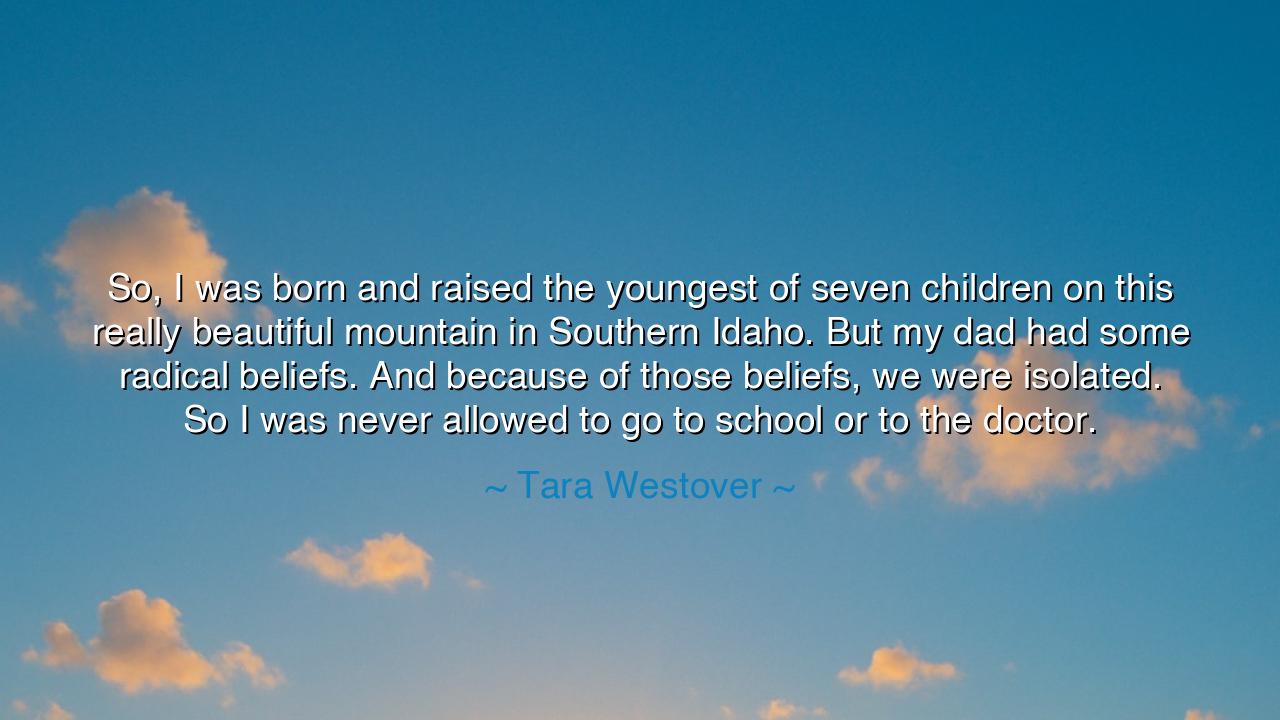
So, I was born and raised the youngest of seven children on this
So, I was born and raised the youngest of seven children on this really beautiful mountain in Southern Idaho. But my dad had some radical beliefs. And because of those beliefs, we were isolated. So I was never allowed to go to school or to the doctor.






The words of Tara Westover — “I was born and raised the youngest of seven children on this really beautiful mountain in Southern Idaho. But my dad had some radical beliefs. And because of those beliefs, we were isolated. So I was never allowed to go to school or to the doctor” — rise from the heart of solitude and echo like an ancient lament about ignorance, isolation, and the struggle for freedom of the mind. In them lies not just the story of one woman, but the tale of all souls who have ever sought light while surrounded by shadow. Her mountain was beautiful, yes, but beneath its majesty, it was also a fortress — both a home and a prison built by belief.
In the days of old, philosophers spoke of two kinds of prisons: those made of stone and iron, and those made of thought. The first can hold the body, but the second can hold generations. Tara’s childhood upon that mountain was one such captivity — shaped not by tyrants of empire, but by the tyranny of conviction. Her father’s “radical beliefs,” like the iron walls of Plato’s cave, kept the children from seeing the world as it truly was. They were denied the light of education, the touch of medicine, the wisdom of the wider world. Yet in that very darkness, a new light began to kindle — the spark of questioning, the divine unrest that no mountain could silence.
This struggle — between obedience and awakening — has been fought since the dawn of thought. Consider Galileo, who dared to look beyond the doctrines of his day and saw the stars as they truly were. He, too, was condemned by belief; his telescope was a window to truth that frightened the world. And like Galileo, Tara’s education became her rebellion. She, born without books, rose to read the very language of the mind itself. Her escape from the mountain was not just a journey into civilization — it was an exodus of the soul, a breaking of inherited chains.
In her father’s world, faith had become fear, and protection had turned into imprisonment. Yet Tara did not emerge from that cage filled with bitterness; she emerged with understanding. For she saw what many forget — that belief, though it may wound, is also born of love, however misguided. Her father sought to protect his family from a world he did not trust. And therein lies the tragedy of many ages: when love without knowledge blinds, when protection without openness becomes peril. It is the lesson that all societies must learn — that truth cannot thrive where curiosity is forbidden.
And yet, from this crucible of constraint arose one of the most powerful stories of our time. Tara’s tale is proof that knowledge is not inherited — it is earned. The schools she was denied became the ones she built for herself through will and wonder. In the silence of isolation, she found her own teacher — the voice within that whispered, “There is more.” That voice, eternal and indestructible, is the same one that stirred prophets, poets, and philosophers through every age. It is the spirit of inquiry, the sacred hunger to know.
Her life thus becomes a living parable for those who walk paths of darkness today. Many are not trapped by fathers or mountains, but by comfort, ignorance, and fear of change. They live in invisible cages, built of conformity and complacency. But the story of Tara Westover reminds us that no matter how high the mountain, the mind can climb higher. No matter how deep the shadow, a single question can bring dawn.
Let this, then, be the teaching passed to future generations: cherish education not as privilege, but as salvation. Question not to defy, but to understand. And when you find yourself in the valley of unknowing, do not curse the darkness — light a lamp of curiosity, and follow where it leads. For to learn is to live, and to seek truth is to honor the divine spark within. As Tara’s journey teaches, freedom begins the moment we dare to think.






AAdministratorAdministrator
Welcome, honored guests. Please leave a comment, we will respond soon